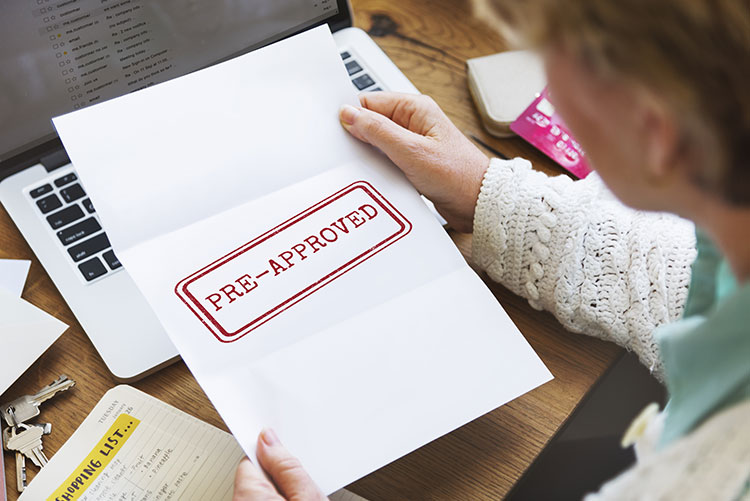
Getting Pre-approved To Buy A Home Is Required On Most Offers Nowadays
Today’s real estate market is competitive. Unless you plan on paying cash for your new home most sellers won’t even entertain your offer unless you provide proof that you can actually buy the home. Many agents will actually require pre approval before allowing higher end homes to even be toward. If you don’t have a pre approval in hand many listing agents may not even present your offer to the cellar. You need to be prepared.
The Distinction Between Pre-Qualification and Pre-Approval
Both pre-qualification and pre-approval offer peace of mind by confirming your eligibility for your dream home’s required loan amount. However, they differ significantly. A “pre-qualification” usually involves an informal discussion, often by phone, with a loan officer. Information is shared and considered to estimate a qualifying loan amount. It’s important to note that nothing is verified or documented, and the loan officer doesn’t make the final decision; it’s essentially an opinion based on their knowledge and experience.
In contrast, a “pre-approval” requires submitting all information and supporting documents to Underwriting, the department responsible for loan approvals or denials. Pre-approvals hold substantial weight. Imagine you’re a seller reviewing three offers on your home: “Buyers A” haven’t contacted a lender, “Buyers B” had a phone conversation with a loan officer, and “Buyers C” submitted documentation, had their credit checked, and been formally pre-approved for your home’s required amount. Which offer would you choose? Without a doubt, the PRE-APPROVED buyer! We strongly advise starting your home buying journey with pre-approval to gain a competitive edge.
Are Pre-Approvals Required
The real estate industry now emphasizes the significance of mortgage pre-approvals in nearly every transaction. Listing agents often stipulate that when submitting an offer, the buyer’s agent must provide evidence of a reputable lender’s pre-approval. They may also request the buyer’s FICO score and Proof of Funds (POF) to verify both creditworthiness and the ability to complete the purchase. These practices prevent the disappointment of discovering a buyer’s ineligibility later in the process. If you’re house hunting and haven’t secured a pre-approval yet, don’t hesitate to contact us to initiate the process.
Choosing the Right Mortgage Company
If you’re seeking a mortgage company, I can help. I have long standing relationships with several of the best Mortgage Brokers around. From FHA loans with low down payments to VA no-down payment loans, reverse mortgage loans for elderly borrowers, and various conventional loans, I have access to them all. While you have the freedom to choose any lender, if you need guidance, reach out, and we’ll help you make the best decision for your unique financial situation and home-buying goals.
Documents Needed for the Loan Officer
To facilitate the mortgage loan pre-approval process, your lender will require a thorough review of various documents. These include documentation related to your employment, income, monthly expenses, credit history, as well as your checking and savings accounts. Additionally, you’ll need to provide information about other assets you may possess, and if applicable, any child support or alimony payments/income. If you own additional properties, you should prepare rental agreements that demonstrate the income generated from those properties. It’s also essential to have mortgage details for each property, including your current residence if you own it.
For self-employed individuals, the lender will request copies of your most recent federal income tax returns for the past two years (specifically, Form 1040). State tax returns are not required. Additionally, a year-to-date profit and loss statement will be necessary.
Here’s a comprehensive list of the items you should gather before your meeting with the lender to ensure a smooth pre-approval process:
- Employment documentation
- Income records
- Monthly expense details
- Credit history information
- Checking and savings account statements
- Documentation of other assets
- Child support or alimony payment/income records
- Rental agreements for additional properties
- Mortgage information for all properties, including your primary residence
- Copies of your last two years’ federal income tax returns (Form 1040)
- Year-to-date profit and loss statement (for self-employed individuals)
Share this on social media:

Getting Pre-approved To Buy A Home Is Required On Most Offers Nowadays
Today’s real estate market is competitive. Unless you plan on paying cash for your new home most sellers won’t even entertain your offer unless you provide proof that you can actually buy the home. Many agents will actually require pre approval before allowing higher end homes to even be toward. If you don’t have a pre approval in hand many listing agents may not even present your offer to the cellar. You need to be prepared.
The Distinction Between Pre-Qualification and Pre-Approval
Both pre-qualification and pre-approval offer peace of mind by confirming your eligibility for your dream home’s required loan amount. However, they differ significantly. A “pre-qualification” usually involves an informal discussion, often by phone, with a loan officer. Information is shared and considered to estimate a qualifying loan amount. It’s important to note that nothing is verified or documented, and the loan officer doesn’t make the final decision; it’s essentially an opinion based on their knowledge and experience.
In contrast, a “pre-approval” requires submitting all information and supporting documents to Underwriting, the department responsible for loan approvals or denials. Pre-approvals hold substantial weight. Imagine you’re a seller reviewing three offers on your home: “Buyers A” haven’t contacted a lender, “Buyers B” had a phone conversation with a loan officer, and “Buyers C” submitted documentation, had their credit checked, and been formally pre-approved for your home’s required amount. Which offer would you choose? Without a doubt, the PRE-APPROVED buyer! We strongly advise starting your home buying journey with pre-approval to gain a competitive edge.
Are Pre-Approvals Required
The real estate industry now emphasizes the significance of mortgage pre-approvals in nearly every transaction. Listing agents often stipulate that when submitting an offer, the buyer’s agent must provide evidence of a reputable lender’s pre-approval. They may also request the buyer’s FICO score and Proof of Funds (POF) to verify both creditworthiness and the ability to complete the purchase. These practices prevent the disappointment of discovering a buyer’s ineligibility later in the process. If you’re house hunting and haven’t secured a pre-approval yet, don’t hesitate to contact us to initiate the process.
Choosing the Right Mortgage Company
If you’re seeking a mortgage company, I can help. I have long standing relationships with several of the best Mortgage Brokers around. From FHA loans with low down payments to VA no-down payment loans, reverse mortgage loans for elderly borrowers, and various conventional loans, I have access to them all. While you have the freedom to choose any lender, if you need guidance, reach out, and we’ll help you make the best decision for your unique financial situation and home-buying goals.
Documents Needed for the Loan Officer
To facilitate the mortgage loan pre-approval process, your lender will require a thorough review of various documents. These include documentation related to your employment, income, monthly expenses, credit history, as well as your checking and savings accounts. Additionally, you’ll need to provide information about other assets you may possess, and if applicable, any child support or alimony payments/income. If you own additional properties, you should prepare rental agreements that demonstrate the income generated from those properties. It’s also essential to have mortgage details for each property, including your current residence if you own it.
For self-employed individuals, the lender will request copies of your most recent federal income tax returns for the past two years (specifically, Form 1040). State tax returns are not required. Additionally, a year-to-date profit and loss statement will be necessary.
Here’s a comprehensive list of the items you should gather before your meeting with the lender to ensure a smooth pre-approval process:
- Employment documentation
- Income records
- Monthly expense details
- Credit history information
- Checking and savings account statements
- Documentation of other assets
- Child support or alimony payment/income records
- Rental agreements for additional properties
- Mortgage information for all properties, including your primary residence
- Copies of your last two years’ federal income tax returns (Form 1040)
- Year-to-date profit and loss statement (for self-employed individuals)








